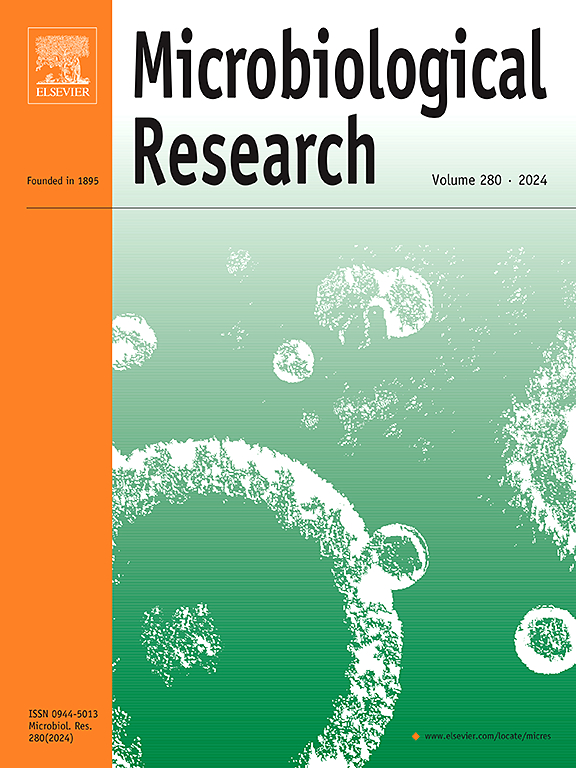Bioinoculant substitution enhances rhizosphere soil quality and maize growth by modulating microbial communities and host gene expression in alkaline soils
IF 6.1
1区 生物学
Q1 MICROBIOLOGY
引用次数: 0
Abstract
The application of plant growth-promoting bacteria (PGPB) as bioinoculants is widely recognized for improving crop yields and soil fertility. However, the precise mechanisms underlying their impact on rhizosphere soil quality and crop productivity remain insufficiently understood. This study elucidates how a solid bioinoculant, comprising Bacillus velezensis FZB42 and attapulgite clay, enhances rhizosphere soil quality and maize (Zea mays) growth in nutrient-deficient alkaline calcareous soils. Pot experiments reveal that bioinoculant application promotes extensive root colonization under nitrogen-deficient conditions, with significantly higher colonization rates observed in the half-nitrogen (HN) and zero-nitrogen (ZN) treatments compared to full-nitrogen conditions. Notably, bioinoculant application in ZN and HN significantly increases phosphorus availability and soil quality in the rhizosphere. Furthermore, maize growth parameters, including plant height, stem diameter, and kernel yield, are markedly enhanced, with optimal biomass accumulation achieved under HN conditions. High-throughput sequencing of rhizosphere microbiomes uncovers significant shifts in microbial community composition, with enrichment of key taxa involved in nutrient cycling and plant-microbe interactions. Transcriptomic analysis of maize tissues demonstrates the upregulation of genes associated with nutrient transport, photosynthesis, fatty acid biosynthesis, and kernel development, with a pronounced enrichment in metabolic pathways linked to growth and productivity. Structural equation modeling indicates that increased microbial diversity and gene expression collectively account for 69 % of the variance in the soil quality index and 45 % of the variance in maize yield. These findings provide critical mechanistic insights into the role of solid bioinoculant in enhancing soil fertility and crop performance, highlighting their potential as a sustainable agricultural strategy for improving productivity in low-fertility alkaline soils.
生物接种剂替代通过调节碱性土壤中微生物群落和寄主基因表达来改善根际土壤质量和玉米生长
植物促生菌(PGPB)作为生物接种剂在提高作物产量和土壤肥力方面的应用已得到广泛认可。然而,它们对根际土壤质量和作物生产力影响的确切机制尚不清楚。本研究阐明了由velezensis芽孢杆菌FZB42和凹凸棒土粘土组成的固体生物接种剂如何在营养缺乏的碱性钙质土壤中提高根际土壤质量和玉米(Zea mays)的生长。盆栽试验表明,在缺氮条件下,施用生物接种剂促进了根系的广泛定植,在半氮(HN)和零氮(ZN)处理下,定植率显著高于全氮处理。在根际施用生物固菌剂ZN和HN显著提高了磷的有效性和土壤质量。此外,玉米的生长参数(包括株高、茎粗和籽粒产量)显著提高,且在高温条件下生物量积累达到最佳。根际微生物组的高通量测序揭示了微生物群落组成的显著变化,涉及营养循环和植物-微生物相互作用的关键分类群的富集。玉米组织的转录组学分析表明,与营养转运、光合作用、脂肪酸生物合成和籽粒发育相关的基因上调,与生长和生产力相关的代谢途径显著富集。结构方程模型表明,微生物多样性的增加和基因表达的增加共同占土壤质量指数方差的69 %和玉米产量方差的45 %。这些发现为固体生物接种剂在提高土壤肥力和作物性能方面的作用提供了关键的机制见解,突出了它们作为提高低肥力碱性土壤生产力的可持续农业战略的潜力。
本文章由计算机程序翻译,如有差异,请以英文原文为准。
求助全文
约1分钟内获得全文
求助全文
来源期刊

Microbiological research
生物-微生物学
CiteScore
10.90
自引率
6.00%
发文量
249
审稿时长
29 days
期刊介绍:
Microbiological Research is devoted to publishing reports on prokaryotic and eukaryotic microorganisms such as yeasts, fungi, bacteria, archaea, and protozoa. Research on interactions between pathogenic microorganisms and their environment or hosts are also covered.
 求助内容:
求助内容: 应助结果提醒方式:
应助结果提醒方式:


